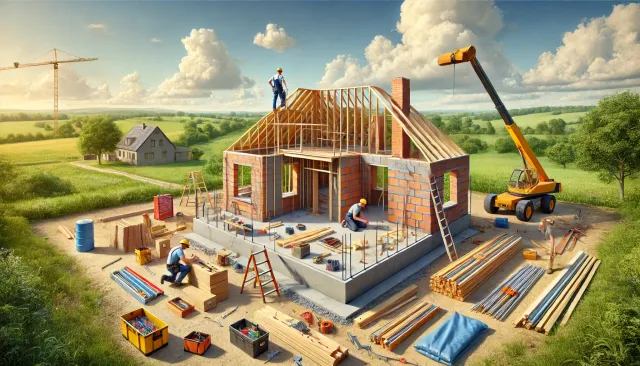Building a house with your own hands is a significant and important task that requires careful planning, knowledge, and skills. In this article, we will discuss all the stages of building a house: from choosing a plot to finishing works. By following our recommendations, you will be able to successfully realize your dream of your own home.
Interesting videos on the topic of building a house that you should familiarize yourself with
1. Planning and Preparation
1.1. Choosing a Plot
First of all, it is necessary to choose a plot for construction. When choosing, pay attention to:
- Location and accessibility of utilities (water, gas, electricity);
- Geological features of the plot (soil, groundwater level);
- Infrastructure and accessibility (schools, shops, transport).
1.2. Developing a Project
The development of the house project includes:
- Architectural plan (appearance of the house, room layout);
- Structural plan (foundations, walls, ceilings);
- Engineering systems (electricity, water supply, heating).
1.3. Obtaining Permits
Before starting construction, it is necessary to obtain all the necessary permits and approvals from local authorities.
2. Laying the Foundation ️
2.1. Choosing the Type of Foundation
The foundation is the base of the house, so special attention should be paid to its choice. The main types of foundations are:
- Strip;
- Column;
- Slab.
2.2. Marking and Preparing the Pit
Marking the area for the foundation is done using stakes and rope. After that, the pit must be dug according to the dimensions of the foundation.
2.3. Installing Formwork and Reinforcement
Formwork is used to shape the concrete structure of the foundation. It is installed around the perimeter of the pit. Next, reinforcement is carried out – laying rebar to strengthen the foundation.
2.4. Pouring Concrete and Caring for the Foundation ️
After installing the formwork and reinforcement, concrete is poured. It is important to ensure proper care for the foundation to avoid cracks and other defects. The foundation should cure and gain strength over several weeks.
3. Erecting Walls
3.1. Choosing Material for Walls
There are several options for materials for wall construction:
- Brick;
- Gas concrete;
- Wood;
- Foam blocks.
Each of them has its advantages and disadvantages that should be considered when choosing.
3.2. Wall Erection Technology ️
The process of erecting walls includes several stages:
- Preparing the base (waterproofing the foundation);
- Laying the first row of wall material with a check for horizontality;
- Sequentially erecting walls with level and verticality control.
3.3. Installing Lintels and Reinforcement Belts
To strengthen the walls and ensure their stability, lintels are installed above window and door openings, as well as reinforcement belts around the perimeter of the house.
4. Roof Installation
4.1. Choosing Material for Roofing ️
The main materials for roofing are:
- Metal tiles;
- Bitumen tiles;
- Ceramic tiles;
- Profiled sheeting;
- Slate.
4.2. Installing the Rafter System
The rafter system is the framework of the roof, consisting of rafters, mauerlat, battens, and counter-battens. It provides reliability and strength to the roof.
4.3. Laying Roofing Material
The process of laying roofing material depends on its type, but general steps include:
- Laying a waterproofing layer;
- Installing roofing material following the laying technology;
- Installing gutters and other elements.
5. Interior Works
5.1. Wiring Utilities
At this stage, all necessary utilities are laid:
- Electrical wiring;
- Water supply and drainage;
- Heating;
- Ventilation.
5.2. Rough Finishing ️
Rough finishing includes:
- Plastering walls;
- Laying a floor screed;
- Installing suspended ceilings.
5.3. Final Finishing
Final finishing is the final stage of interior works, which includes:
- Painting walls and ceilings;
- Laying floor coverings;
- Installing doors and baseboards.
6. Final Works and Landscaping
6.1. Installing Windows and Doors
After completing the main interior works, windows and doors are installed.
6.2. Facade Arrangement
Facade works include:
- Insulating the facade;
- Finishing (plastering, cladding with stone or tiles).
6.3. Landscape Design
The final stage is landscaping the area around the house:
- Laying paths;
- Greening (lawns, flower beds, trees);
- Installing a fence.
Useful Tips and Recommendations
For successful construction of a house with your own hands, consider the following tips:
- Follow building codes and regulations;
- Regularly monitor the quality of the work performed;
- Do not skimp on materials and tools;
- Involve specialists for complex tasks (electricity, water supply);
- Plan the budget considering unforeseen expenses.
Conclusion
Building a house with your own hands is a complex yet exciting process. By following our tips and recommendations, you will be able to successfully realize your dream of your own home. Good luck with your construction, and may your new home become a true family hearth!
